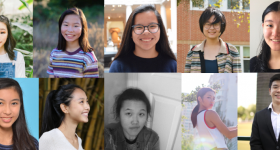Inez Tan’s poem is a road trip through the psyche, mapping out memory and family history onto a rich California landscape. Here, what is clarified by a line holds equal weight to the silence of the white space, pulling us along the journey like synapses sparking with memory fragments until we come full circle.
—Marci Calabretta Cancio-Bello, Poetry Editor
The Long Circuit
1.
California was a place in books and movies—
paper, film, and self-mythology.
A woman riding a motorcycle in a story I read when I was seventeen
gets hit by a car. She relates,
In the hospital, after injections,
I knew there was pain in the room—
I just didn’t know whose pain it was. California.
I was living there when one of my relatives died.
Then another. And another.
It was happening in my twenties,
right on schedule.
The knowledge of grief
is nothing like grief.
From sunset-swaddled California,
I slept through all the funerals.
2.
When I don’t understand something
I turn to books. One I’m reading now argues
that searching directly for who you really are
is pointless. Instead,
what is most valuable, real, and
substantial about you will surface when
you recognize those around you
and how you can serve their needs.
Or survive them,
I think. Consider what produces
a hooked beak, a fan-shaped seed, a protective coat
of needles.
3.
Talking to my parents I hear a sound
like a broken filament
jingling against glass.
Something always hangs
unfinished between us.
Only what we do says
yes, this is inside me—
or see, you have made me
frugal, overprotective, quarrelsome, hungry.
Let there be no sad immigrant stories
though my grandfather came to Singapore as a child
ate nothing from the time he walked away from his village in China
had to wait at the docks all night until his father
could borrow enough money to redeem his passage,
though eighteen lived
in one apartment, three generations kept from sleep
by the gambling debts, the winged roaches,
the rats bloodying one another in the garbage,
like everyone in those days, the older generations say dismissively
though of course that isn’t true,
but the older generations don’t talk much about those days
for their own reasons,
and I don’t ask much
for my own reasons.
4.
I relate to this relatable character.
I am related to my relations:
circuitous propositions,
on their own,
enclosing nothing.
5.
For months I didn’t go to the beach
because I didn’t want sand in my car. I knew
I’d never get rid of it.
In late acceptance finally I drove with the windows down
and walked along the indecisive edge of the ocean, I thought of arguing
every Sunday with my parents about why
they were making me crawl inside their car
to pick up anything the vacuum had missed, crouch
by the tires to scrub each blackened groove
that spun along the burning road, the song
in my head
I’ll never be like you, never never be like you,
like I had a choice in that matter,
as the waves wiped out what my feet were trying to remember.
6.
Yet this is
dancing to the YMCA song with my cousins
kneeling by a basin filling water balloons
fanning the barbecue pit with newspapers
riding the peeling carousel at the mall
fighting over glazed strawberries
scoping out every vending machine in the hospital
drawing on one another with lipstick
feeding our bread to the neighbor’s dogs
whispering in the columbarium
lying about mosquitoes as we slapped one another’s faces
melting chocolate on the stove
hitting one last shuttlecock onto the roof
cramming the Christmas tree back into the box
inside me
the hook in my heart of
knowing like that.
A hook on a living line.
7.
My friend Jason calls it
a wire through the generations,
trauma. I want to believe
joy is inherited too, he says—
wouldn’t they want us to have this, as well?
What if you told him you enjoy thinking
that you were born
lacking the instinct for family? That you have felt that
empathy is incorrect, and something
else is required?
Just as the sun dips below the earth's midriff
there is an otherworldly green dot
that hovers on the horizon for about four or five seconds
only in southern California.
We watch it disappear as the planet turns away,
as people with our blood
on the other side of the world
spend their time in the sun.
8.
I don’t like talking.
I think I get that from my family.
I turn over their photos of the memorial services,
photos without captions.
Maybe funerals feel so strange
because they’re like private holidays,
holy days,
you go to work in your usual clothes and say nothing, and no one
has any idea, you’re not
even sure what you’re feeling.
Your own culture, and you don’t know how to speak of it.
The immensity that makes you feel
insignificant.
The long circuit of all the ones who lived so you could live.










Comments